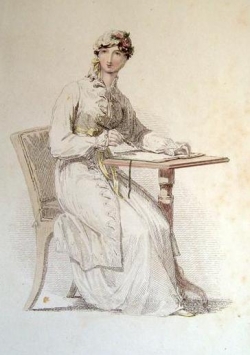 The Regency romance is one of the most popular types of romance published–but what makes for a good Regency? What do you need to know to write one.
The Regency romance is one of the most popular types of romance published–but what makes for a good Regency? What do you need to know to write one.
I’m teaching a workshop on Writing the Regency this July (22-Aug 18), but here are a few basics:
1-Voice. First things first, and the first thing any Regency novel needs is the right voice. Now the Regency voice can be funny or dramatic, but the feel has to be something that invites the reader into a world that doesn’t exist–yes, it’s the past, but it’s a past that no one’s been to, so it’s up to the writer to come up a “tone” or voice that feels right. It’s the sort of thing that readers know, and the writer has to find.
2-Research. This is the one that stops most folks. The odd thing is that contemporary novels can need research, too, particularly when you dip into fields that aren’t your own (medical, legal, cowboys, fire, etc. etc.). The trick to research is to know the right questions to ask–what do you need to know. And where do you go to find it? Too much time spent in research means too little time spent writing.
3-Plausibility. Readers have to buy into the world. You can actually have accurate details–but will readers believe them? The same goes for the characters. Do you have people who make sense within this world you’re creating? The reader has to believe not just in your characters, but that your characters could have existed within the Regency world.
4-Glamour. The Regency is an era of style–of wit. And clothes. And, also, titles. Lords and ladies, and getting this wrong can throw a reader right out of the story. Setting matters, as does the furniture, and the outfits. We all want to be swept away–that’s part of the attraction of the past.
5-History. Technically, you don’t need too much of this in a Regency (you can go for costume drama). But you do need some basics, otherwise why bother setting a book in this era. And if you’re writing a Regency mystery, or historical fiction, you need more than the basics. But part of this is why you pick the Regency to start with–it helps a lot if you’re more than a little in love with the era.
6-Details. The right details can make or break a story, and this is where you want to find fresh details (and not just repeat what other authors may have done in their stories). The search for these details can be like a treasure hunt–the one trick here is not to stuff every little detail you find into one story.
7-Adventure. We read about the past because it is past–nicely, safely so. But it’s also a time with a touch of adventure, with swords and duels, war and spies, candlelight and balls. It’s a place for the reader to move into and have a short adventure into that past. The adventure may be as simple as an elopement or as complex as an unsolved murder, but a touch of this always helps any Regency.